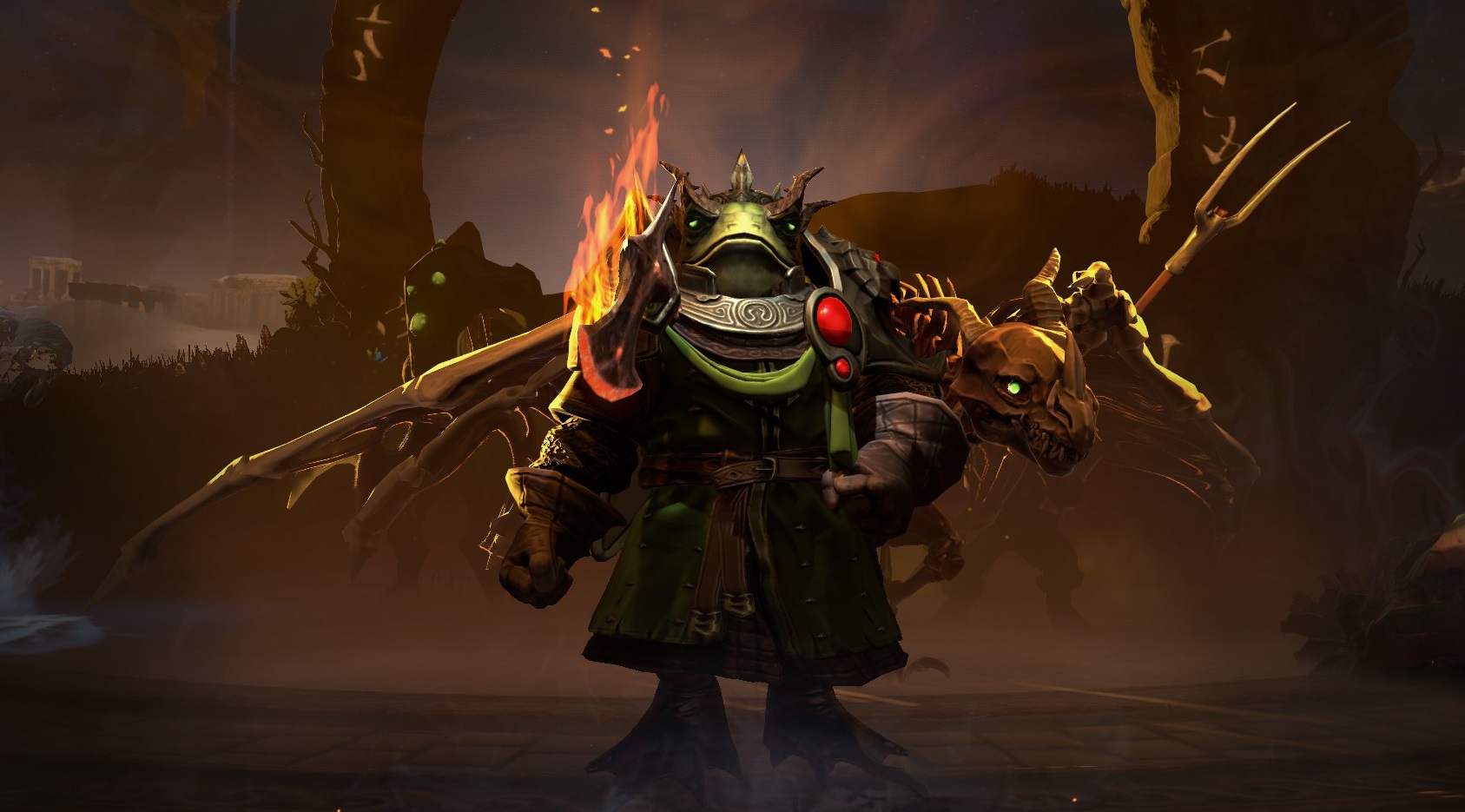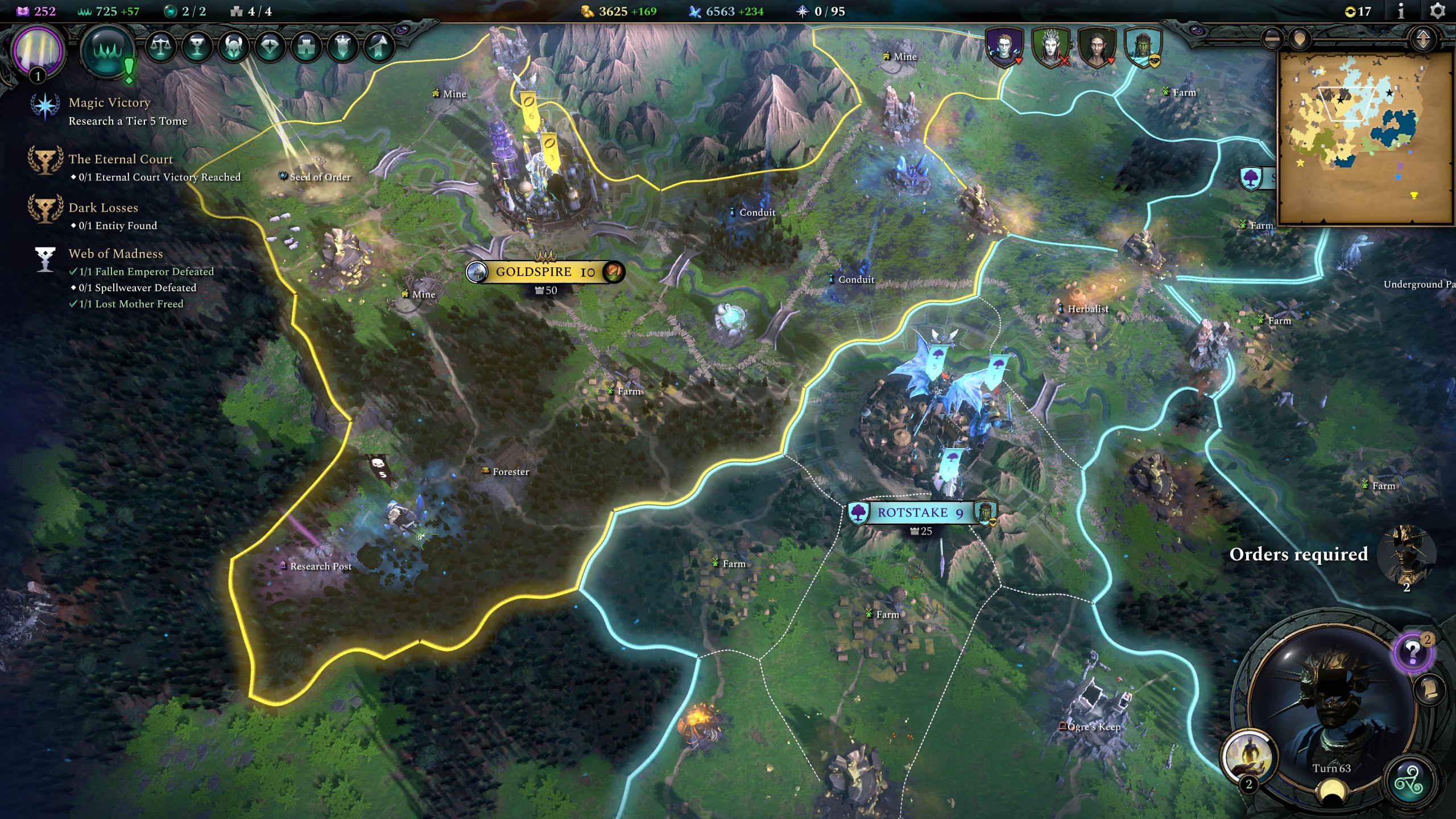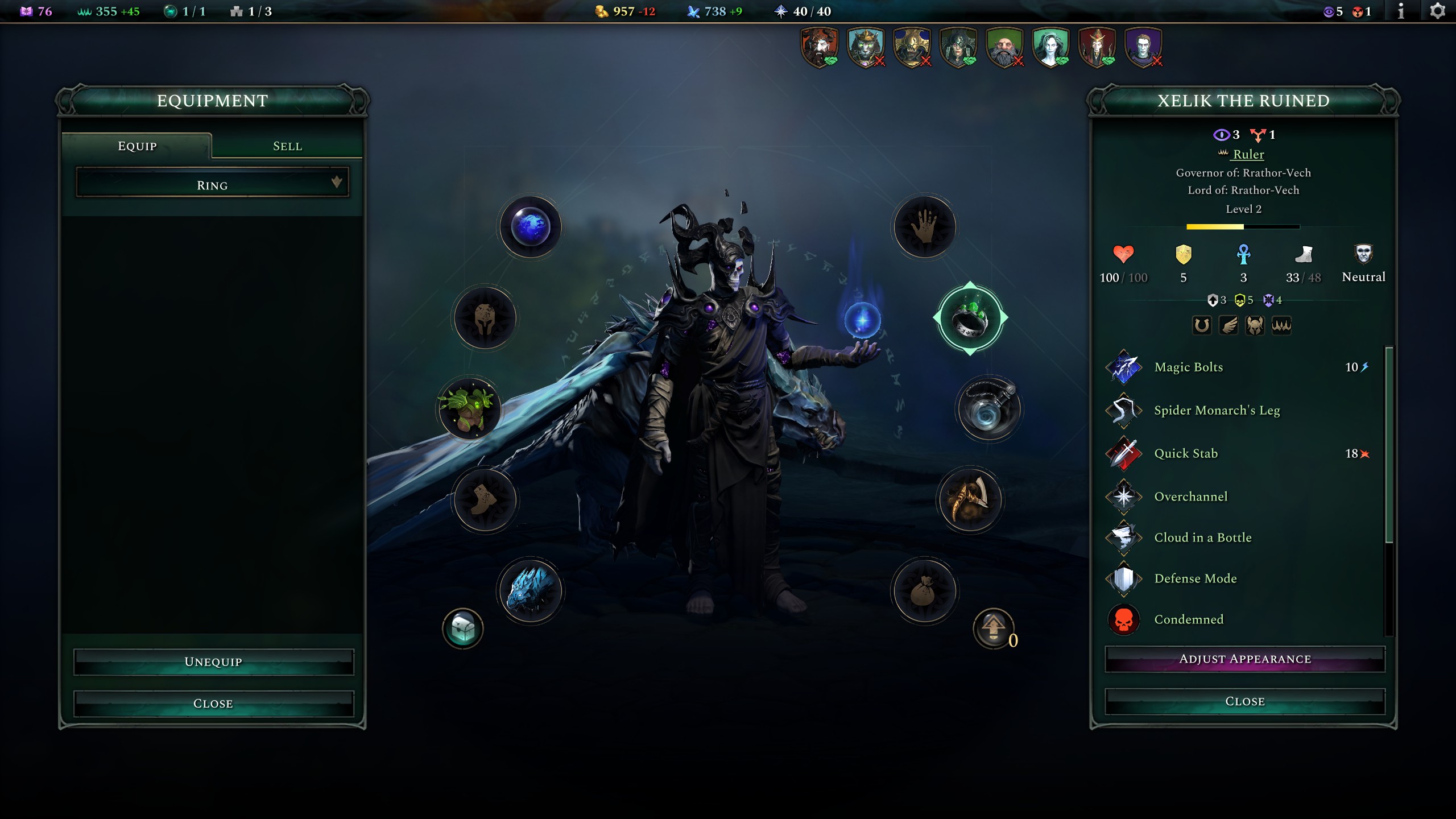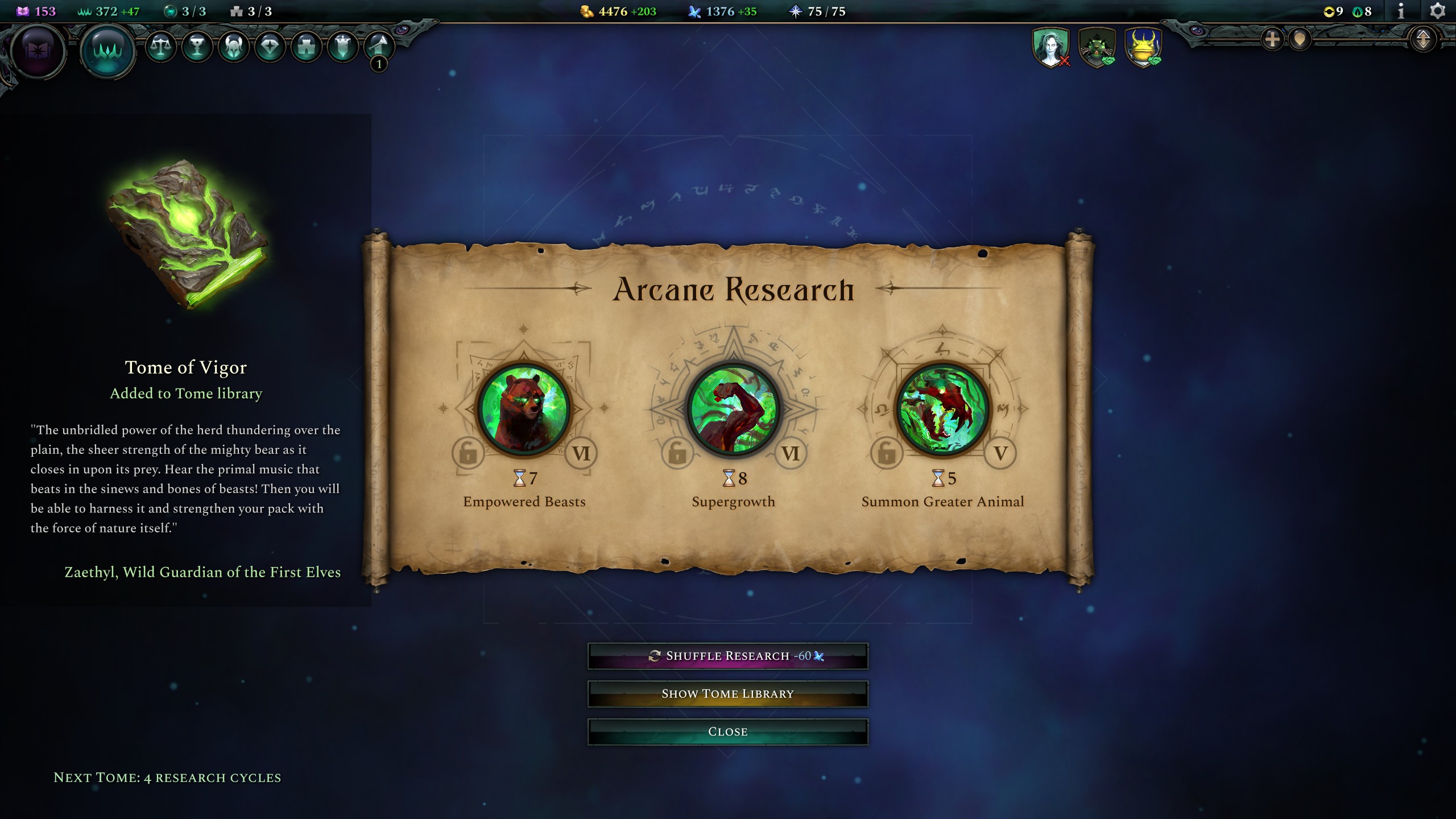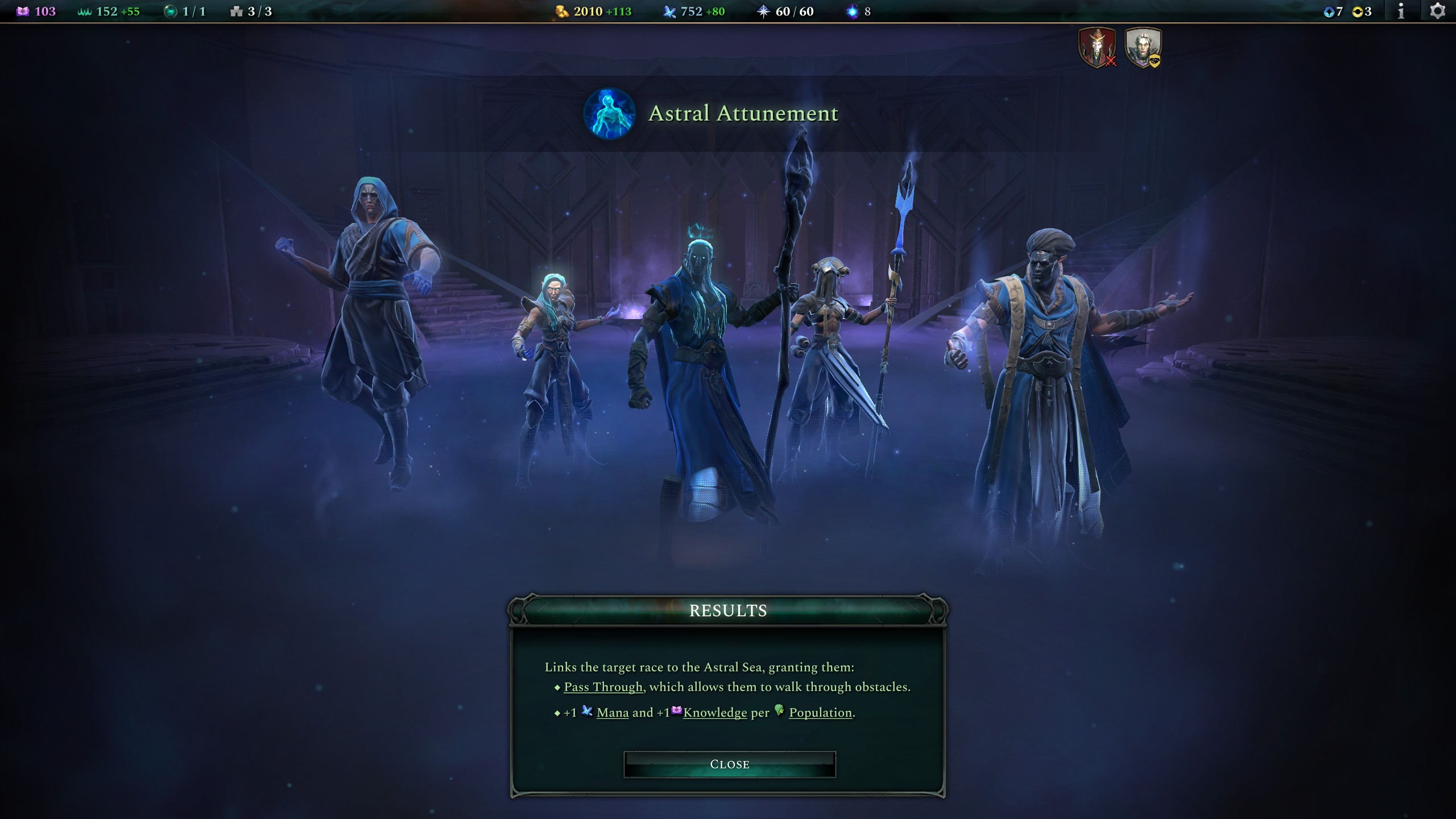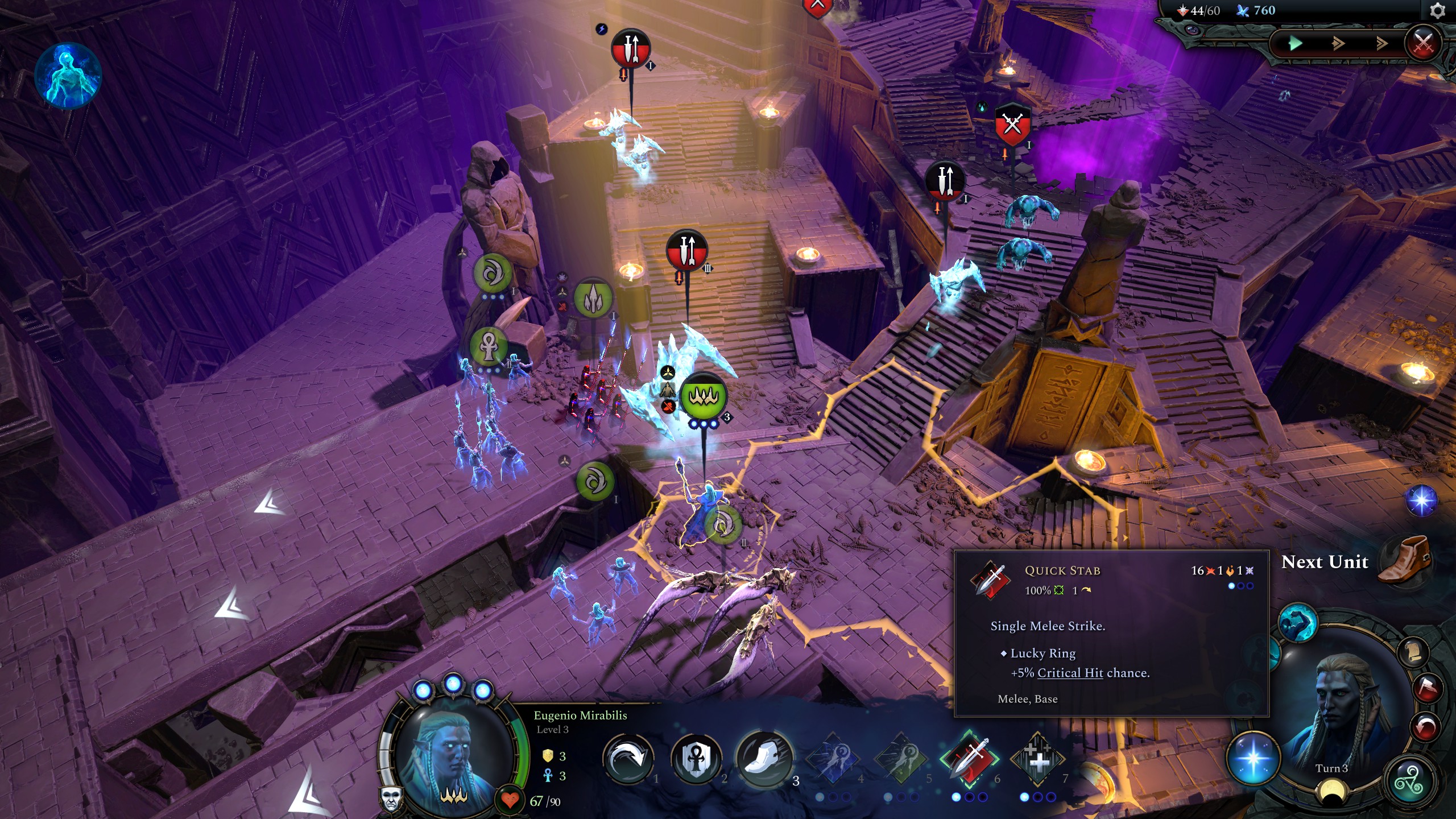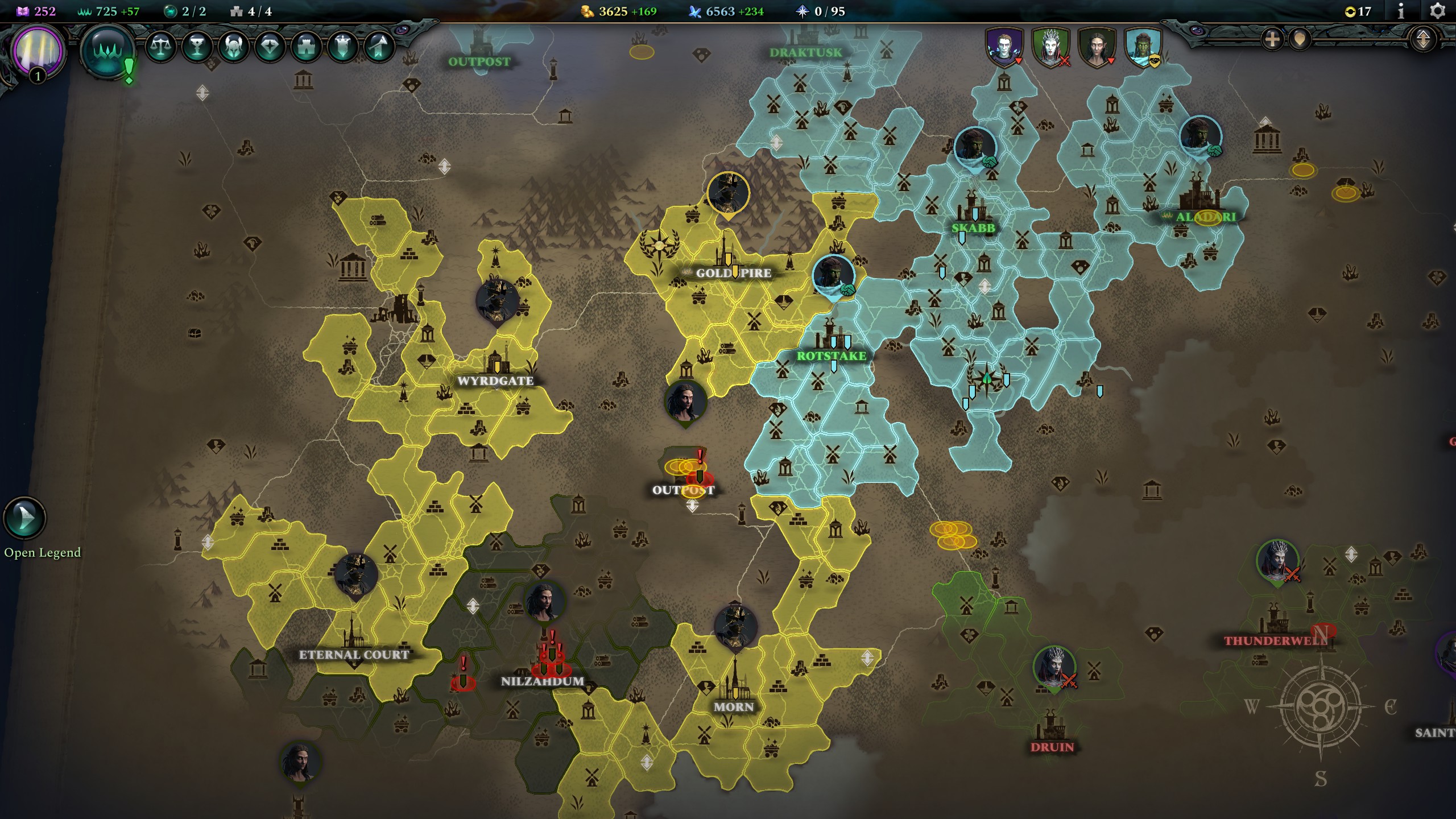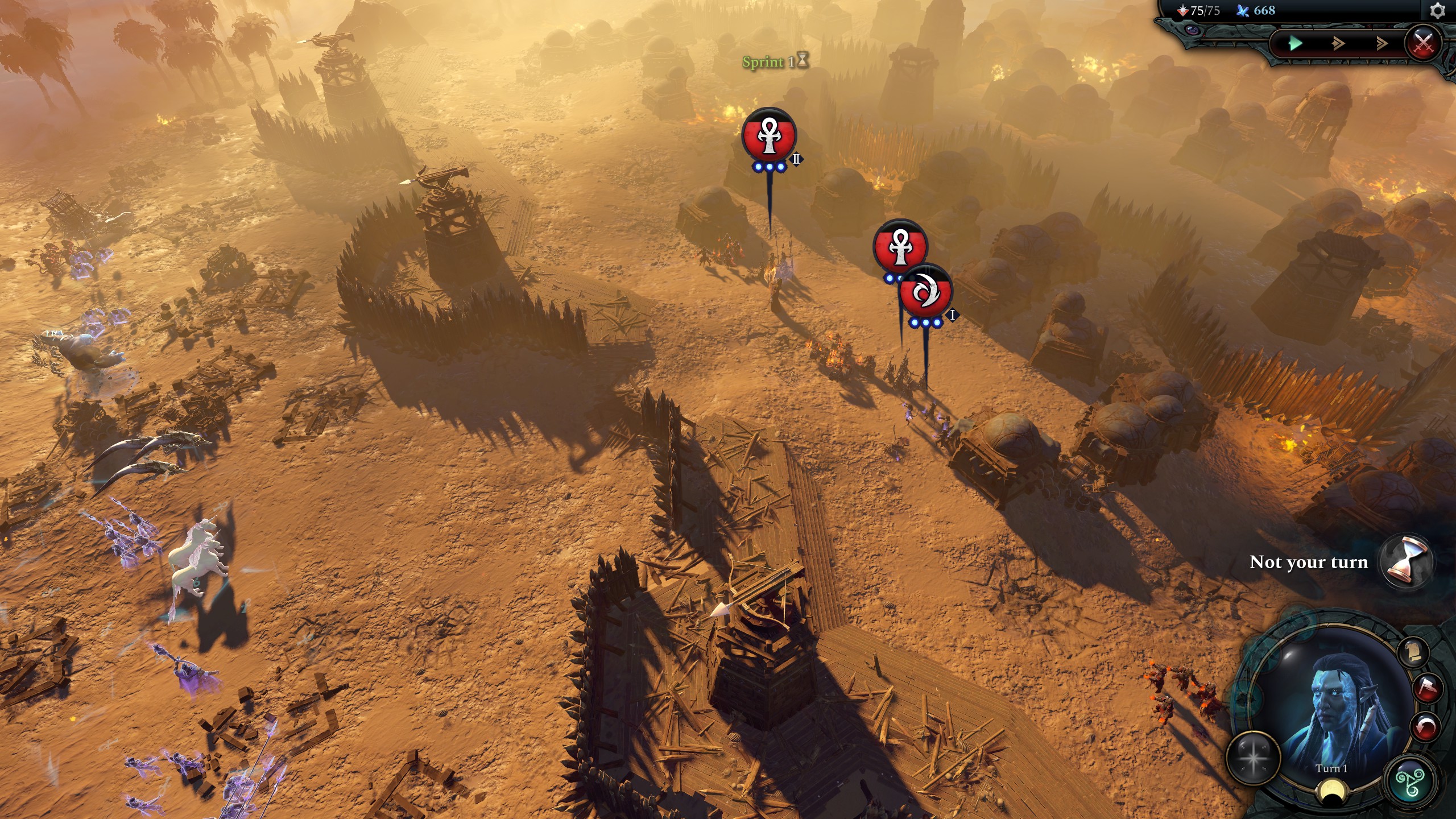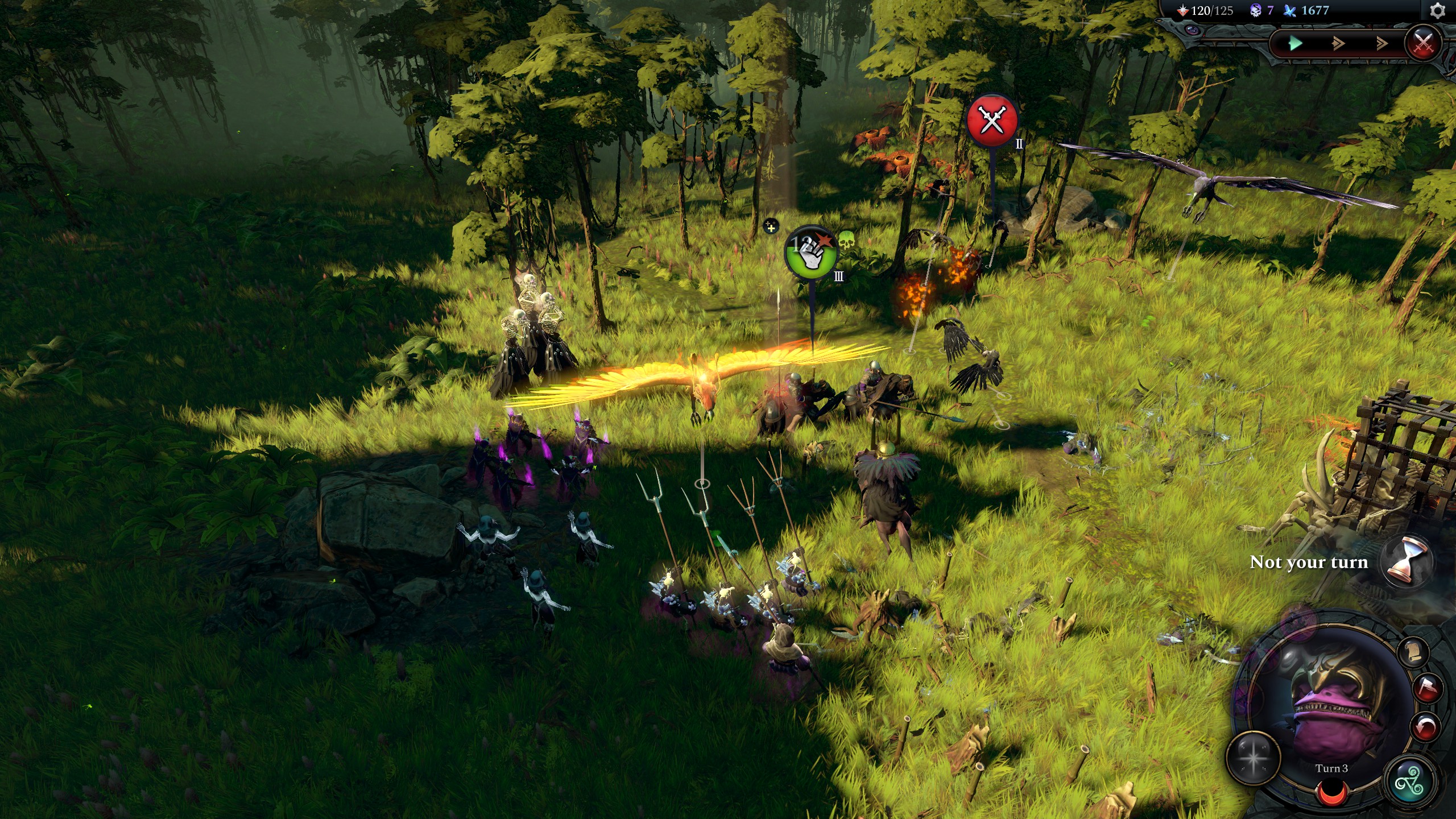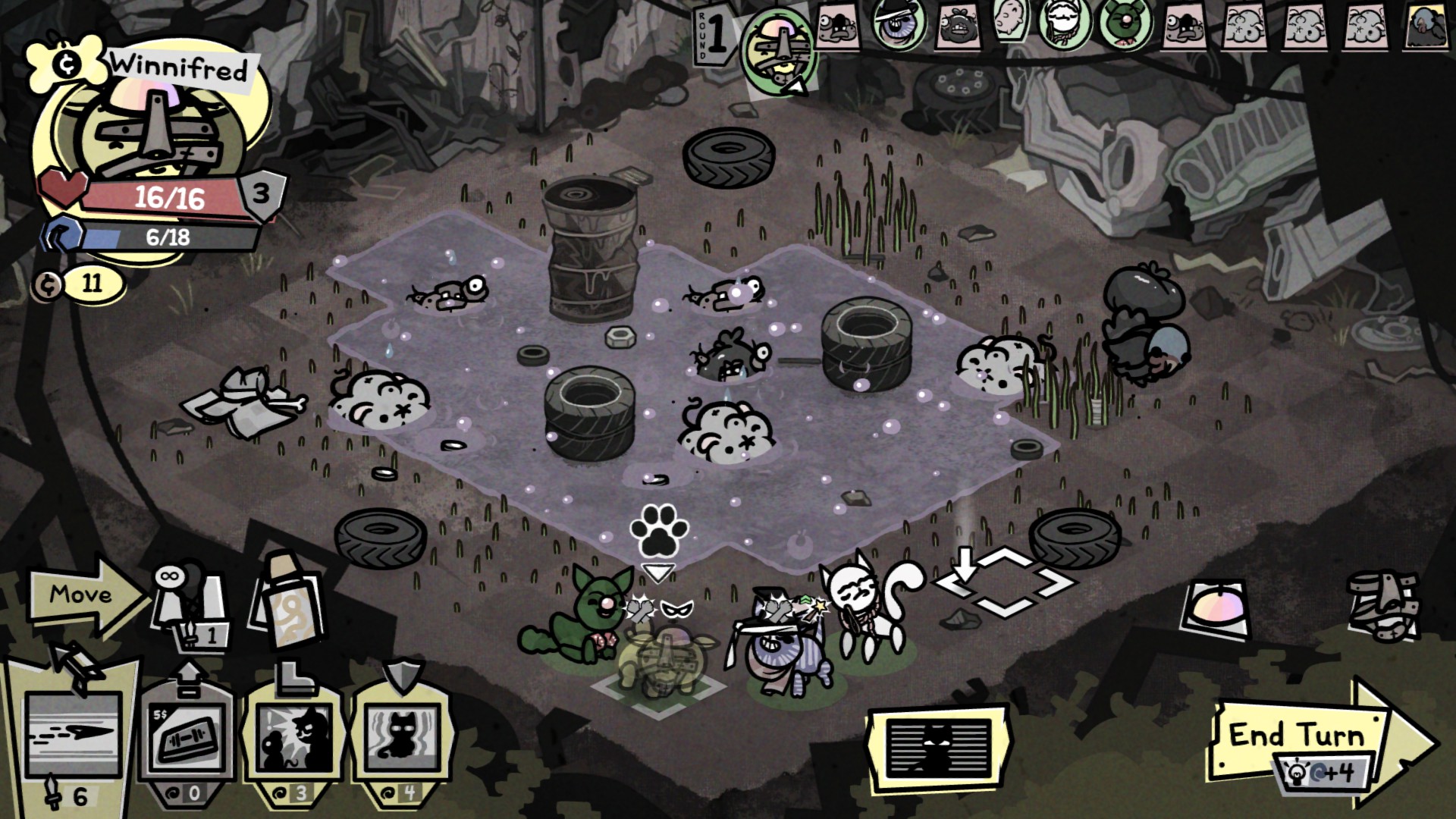Our Verdict
A flavourful and inventive 4X full of incredible spells and engaging empire management.
PC Gamer's got your back
What is it? A fantasy 4X with a fantastic magic system.
Release date May 2, 2023
Expect to pay £42/$50
Developer Triumph Studios
Publisher Paradox Interactive
Reviewed on GeForce RTX 1080Ti, Intel i7-8086K, 16GB RAM
Steam Deck Playable
Link Official site
Magic is rarely wondrous in its frequent videogame appearances. It harms, it heals and if you're lucky it maybe transforms enemies into sheep or frogs. Not so in Age of Wonders 4, however, where it drives every component of this arcane 4X, dramatically transforming worlds, cities and the creatures that inhabit them. With your expansive collection of magical tomes, you can dabble with god-like powers to your heart's content.
The Wizard Kings—would-be deities—have awoken in the Astral Sea and are ready to exert their influence over the multitude of worlds that exist in this magical realm. As one of these Wizard Kings, or a mortal champion, you must grow in power to dominate these worlds, using magic and warfare to put the competition in its place.
Age of Wonders 4's structure should be familiar: you start with a single city, erect new buildings, develop the surrounding provinces, recruit armies and explore the map to find treasure and new enemies. Resources like food, gold and mana must be managed, rival rulers can be engaged diplomatically or aggressively, and eventually you'll start working towards one of the victory conditions, perhaps focusing on magic, or maybe just conquering everyone.
But the latest game in this long-running series is still distinct from its forebears. It makes this clear right away, when you pick the foundations of your magical empire. First, there's the map. There's an abundance of premade maps, including ones that are part of the story-driven campaign, but you can also spawn your own, selecting its traits. Maybe you want to conquer a frozen wasteland full of monsters, or a fiery hellscape split up by a molten sea, where the only safe route across is underground. There's no dearth of compelling choices here, letting you make all sorts of exotic battlefields.
It's in the creation of your prospective empire where things get really interesting, though. By selecting the physical form, traits, cultural leanings and societal quirks of your people, you're able to create all sorts of unusual empires, from sinister mole-people with a penchant for cannibalism to industrious goblins who just want to build epic cities and make new friends. Through these choices you'll determine your empire's starting bonuses, alignment and magical affinities, establishing how you'll influence the world.
Wizard builder
Nearly as important is the creation of your ruler. If you pick a mortal champion it will be from the same species you just created, while Wizard Kings can be from any species. Initially you're just selecting their physical appearance and starting weapons, but over the course of the game you'll find plenty of new gear and XP to bolster their power. Rulers, and the heroes you'll recruit later, represent the most powerful units in the game, and while they can benefit your empire by governing cities, where they really shine is in the tactical battles.
Your long-term goal might be to transform your empire's citizens into undead monstrosities themselves.
The downside of this style of empire creation is that, while some of the choices you make can have a big impact, a lot of it is highly situational or under the hood, or more flavourful than practical. In the early game in particular, you won't notice a whole lot of difference between your industrious goblins or sinister mole-people. You're not going to get the sort of wild variety that you'll see in, say, Amplitude's Endless series, where each faction has dramatically different, bespoke playstyles with unique systems at their disposal. At least not at first. Once you start building on top of these foundations, however, your experiences will start to become more distinctive, leading to a much stronger mid and late game.
Keep up to date with the most important stories and the best deals, as picked by the PC Gamer team.
While those early turns can be a bit repetitive, the creation process still ensures that you'll start with a well-defined empire and thus some clear goals in mind. If you've crafted an empire of evil doers who use soul magic, for instance, you'll want to start getting into fights quickly, stealing enemy souls to fuel an undead army. Your long-term goal might be to transform your empire's citizens into undead monstrosities themselves. That's what Age of Wonders 4 calls a "major transformation"—one of several ways you can enhance your empire's denizens.
Instead of a conventional research system, Age of Wonders 4 doles out tomes of magic, each containing a variety of spells. Tomes are connected to the game's cosmic affinities, like order, chaos, nature and so on. There are five tiers of tomes, and for every affinity you get two possible tomes for each tier. In keeping with the game's love of experimentation, there are no restrictions here. If you have an empire with a love of order, you can still pick whatever tomes you want, though these choices will start to change your affinity, and thus how other empires and free cities (unaligned city states who can be vassalised or conquered) view you, and how your empire develops as new affinity skills are unlocked in the separate empire development tree.
By researching spells from these tomes, and unlocking new tomes, you'll rather quickly find yourself with a rich bounty of city enhancements, summons, transformations and enchantments, as well as all sorts of defensive and offensive spells. The impact these spells can have is gargantuan, especially when working in tandem. If you've transformed your species so that it's faster when travelling through forests, for instance, then you'll definitely want to select the spell that lets you create new forests, transforming the land itself so that you can better traverse it. Granted, series veterans will recognise a lot of the spells that crop up, but the way that magic evolves your empire, and the synergies these transformations create, is extremely novel.
It's genuinely exciting when you get the opportunity to grab a new spell, as you try to figure out how it fits into your repertoire and what role it will have in your conquest of the world. The tomes also let you unlock new buildings and recruitable units, so they aren't exclusively a source of spells. Some units will have to be recruited at a city for gold, but others appear as magical summons, helping you out in a pinch. I've lost count of the times I've been faced with an enemy that's bound to squash me, far from any of my cities, and a summon has saved the day.
Magic still has its limitations. Spells require mana, and any enchanted or transformed units will chip away at your stockpile. And while you can use as many minor transformations as you want, the powerful major transformations are limited to one. But that limit is per species. Add members of another species to your empire, either through conquest or diplomacy, and you'll be able to evolve them in completely different ways. This gives you tremendous flexibility and so many ways to counter obstacles.
Tomes are so much more than just a magical take on tech trees, and I've never had so much fun developing an empire before. Even in Stellaris, with its vast number of ways to evolve your species, I always feel like I'm making a lot of less engaging choices before I get to the good stuff. In Age of Wonders 4, I'm getting new toys to play with, new abilities and new ways to progress constantly.
One thing that might rankle micromanagement fans is how streamlined this is compared to Age of Wonders: Planetfall, where every unit had a bunch of mod slots that let you enhance them at an individual level. Age of Wonders 4's transformations and enhancements are much broader, so that moment-to-moment you're making much more dramatic changes. Both systems have their strengths and weaknesses, but there's so much that's already going on in Age of Wonders 4 that I found I appreciated the ability to make sweeping changes to my entire empire at the click of a button.
Take a hint
The result is a more approachable Age of Wonders, but it should be noted that streamlining is not the only way that Triumph has achieved this. There's the helpful nested tooltips, a codex and a hint system that should make your life easier, but also mechanical improvements. Take your cities, for example. In Age of Wonders 3, you'd need to make a choice between recruiting units and constructing buildings, but here you can do both simultaneously thanks to the separate queues. Without the need to prioritise, you might expect to run out of stuff to build and recruit quite quickly, but the frequency with which you'll unlock new units, and the wide range of construction projects, which in turn unlock even more projects, mean that even in a long game you'll have plenty to keep you occupied.
Plenty of complexity remains, too. City borders can be pushed out by annexing provinces and developing improvements on top of them. At first it's straightforward: if you need more food to grow your population, you'll want to build some farms. If you're near a gold deposit and need to fatten your bank account, build a gold mine. But to take advantage of these provinces you'll need to make sure they aren't occupied by monsters. And you've got your rivals and their claims to worry about. Annex a province that they've got a claim on and they'll get a grievance against you, which can be used as an impetus for war.
Adding yet more wrinkles, but also opportunities, are unlockable special improvements that can be constructed at your city and then placed on provinces already in your border, removing the bonus that you're currently receiving for something more esoteric, like a spelljammer or a teleporter. The latter is a real godsend, especially in the larger maps, because getting around can take an age, especially if you need to pass through areas where the terrain is rough. There's a city cap (which can be increased), but outposts don't contribute towards this, so I often find myself using them to create teleportation networks, allowing my armies to blink across the map and react to any crisis instantly.
Not that there isn't value in exploring the map on foot. Age of Wonders 4's worlds are striking, incredibly detailed fantasy realms absolutely teeming with diversions. Ancient wonders full of treasure, monsters needing to be chased out of provinces, infestations that can spawn invasions and events that can crop up for all sorts of reasons—the only thing rulers don't need to worry about is a life of peace and quiet.
Age of Wonders 4's worlds are striking, incredibly detailed fantasy realms absolutely teeming with diversions.
You'll never have to look far for a fight, with most maps bursting with monsters, even if you're playing nice with your rival champions and Wizard Kings. The UI, which is excellent across the board, is especially helpful when you're preparing for a brawl, as hovering over an enemy will show you exactly who will be involved (up to three armies with six units each can work together in battle) and what outcome is expected. You can auto resolve every fight, but if it doesn't go your way, you can try again with manual control without reloading—a very welcome convenience.
When you're ready to get into the thick of things yourself, you'll be transported to a tactical map that reflects the area you're fighting in. Sometimes this means an ancient ruin or some rocky terrain full of cover and chokepoints, but too often I found myself duking it out in a mostly open area. Planetfall's maps definitely seemed more tactically nuanced. Even the more open maps have environmental hazards and other points of interest, however, and the fights themselves have a lot going for them, as magic and monsters and special world traits collide to create lively conflicts where you need to parse a lot of information to succeed. There's a lot to take in as you try to figure out what each effect actually does, and then reconsider your plans in an attempt to counter them.
Demolitionist
Sieges, meanwhile, involve an extra layer, where the defender can utilise a variety of fortifications and tricks to win the day, while the attacker can undermine them by spending resources on siege projects prior to the battle. And depending on how you've built your species, you might be able to overcome some of these obstacles. If your army has evolved into angelic beings they can fly over walls, while astral armies can simply pass through them.
Outside of battle, there's always something stopping you from leaving the game or hitting End Turn over and over again. Maybe you'll be approached by some citizens who want your advice, potentially netting you rewards, an alignment change or giving your species a new trait. Another ruler might get in touch with a quest, sending you off on an adventure to some unexplored place. Or it could be as simple as an army you're about to attack deciding that you're way too tough for them, letting you decide their fate without a fight. Maybe you'll recruit them to work in one of your cities, or join your army. Through these events a narrative forms: the story of your empire.
AoW4 also has a more explicit story, told through five missions. It's conventional stuff, with two groups of Wizard Kings fighting over ancient power, but the missions themselves offer engaging objectives and special features. The third mission, for instance, gives you a spell that reveals sneaky ways to defeat your rivals, like buying a rival's contract from their demonic master, allowing you to remove them from play without conquering their empire. Ultimately, though, the sandbox maps are just as deft at generating compelling tales and objectives through random chance.
With all the ways you can develop your empire, Age of Wonders 4 demands to be played over and over. But there's also an overarching progression system, the Pantheon, that encourages you to hop back in. Founding cities, forging alliances, completing quests and countless more activities will net you Pantheon XP, which in turn unlocks points that can be spent on the Pantheon tree. Rewards include new cosmetics, icons and gear, which can be used in your next game. Through this system you'll also automatically unlock new map types. Meanwhile, rulers you've created can join the Pantheon, allowing them to appear in future games as potential friends or adversaries. Conceptually, I'm a big fan, though I confess that I would have liked Triumph to do more with it. A new cape or hat doesn't hold a whole lot of appeal.
Not that I need more excuses to keep coming back. Age of Wonders 4 scratches my itch for experimentation like few other strategy games, seducing me back in to try new tome combos and drag my empire in new, weird directions. And every time, I return from my fantasy foray with a sack full of anecdotes, like when I resurrected a rival ruler who had been plaguing me all game as an undead minion, forced to serve me for eternity. Magic just makes everything more fun.
A flavourful and inventive 4X full of incredible spells and engaging empire management.

Fraser is the UK online editor and has actually met The Internet in person. With over a decade of experience, he's been around the block a few times, serving as a freelancer, news editor and prolific reviewer. Strategy games have been a 30-year-long obsession, from tiny RTSs to sprawling political sims, and he never turns down the chance to rave about Total War or Crusader Kings. He's also been known to set up shop in the latest MMO and likes to wind down with an endlessly deep, systemic RPG. These days, when he's not editing, he can usually be found writing features that are 1,000 words too long or talking about his dog.
